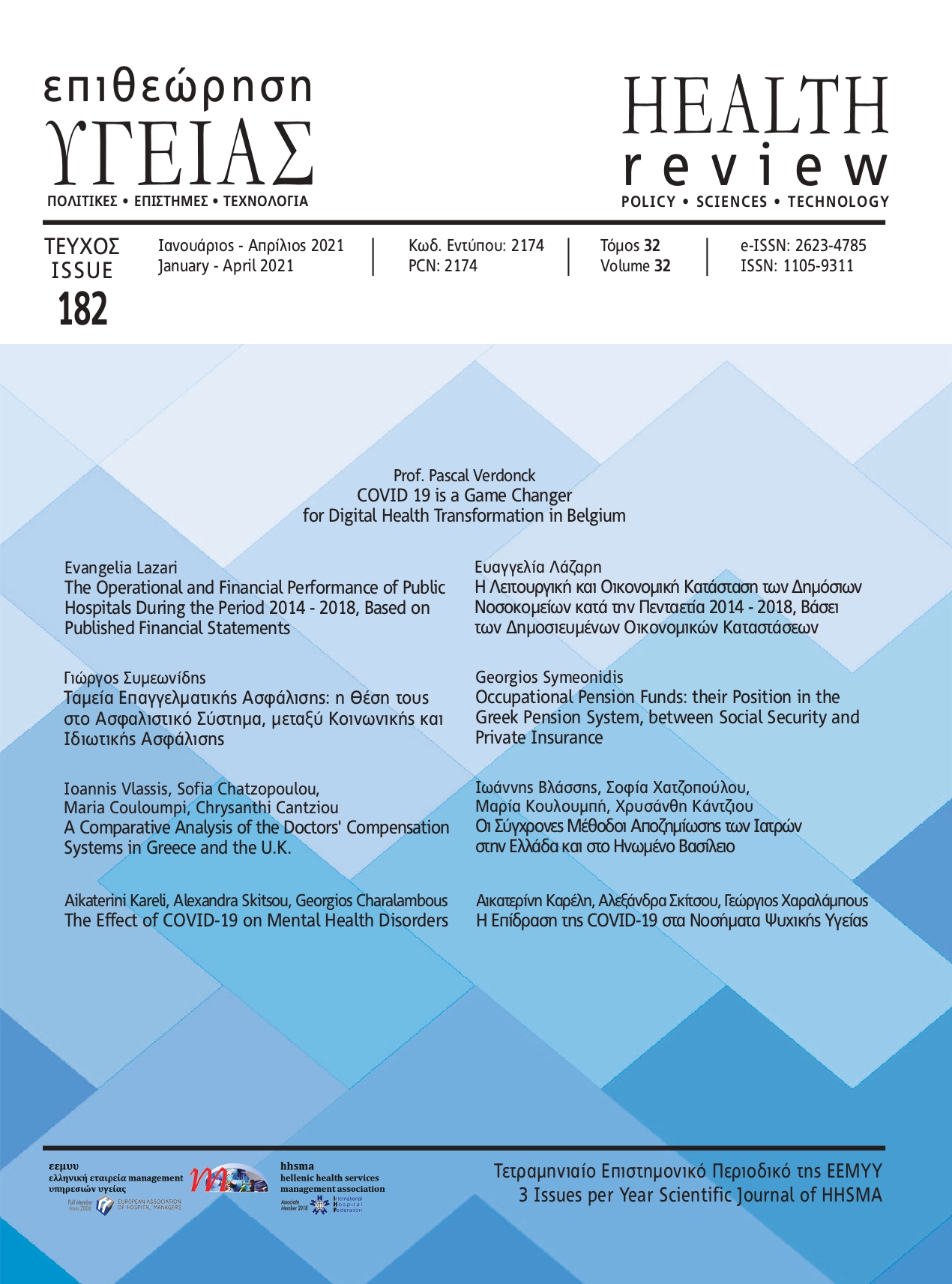
3 Issues per Year Scientific Journal of HHSMA
Editor in Chief: Georgia Oikonomopoulou MSc, PhD(c), Board Member of HHSMA, Board Member of EAHM
Latest Published Articles
Introduction: Financial statements of public hospitals provide information to those who have a reasonable interest in their financial position and performance (e.g. the Parliament, the Regional Health Authorities, the Ministry of Health, the taxpayers, the suppliers, etc.). The information provided is useful to users for accountability purposes and decision making. Purpose: The purpose of this study is to investigate the preparation of audited financial statements, the benchmarking of key operational and financial figures, the analysis of financial figures with cost indicators and the qualitative analysis of certified public accountants’ (CPAs) audit reports. Methodology: The audited Financial Statements as well as yearly hospital activity data from Business Intelligence (B.I.) Platform were collected and processed. The quantitative data characterizing operational and financial performance of public hospitals were compared, through timeseries analysis. Results: The analysis demonstrates key financial figures for the period from 2014 until 2018 namely receivables, cash and cash equivalents, short-term liabilities, operating income, operating expenses and net profit or loss. Moreover, bed occupancy rate, cost per inpatient and cost per inpatient day are calculated at both hospital and health region level. Conclusions: The analysis provides useful information about operational and financial performance of public hospitals. Many hospitals lack timeliness, due to unpublished annual financial reports. Cash accumulation and decline in short-term liabilities were observed, while in total the operating income is higher than the operating expenditure of public hospitals. The financials are fairly presented with the exception of some specified areas. Suggestions are made for improvement and speculating on future directions.
The Greek Pension System is founded on the premises of the multi-pillar system notion as expressed by the World Bank Group. The first pillar comprises social security, the second one comprises Occupational funds and the third one consists of private pension funds. The location of the second pillar is not exactly defined, by most researchers, as it constitutes neither social nor private insurance. Simultaneously, it bears resemblances to both. The aim of this study was to explore this delicate matter and characterize the nature of the second pillar. We result in a focused position as regards the second pillar location amongst the other two. More specifically, the main finding shows that occupational pensions are closer in nature to Social Security than they are to Private Insurance, whilst they constitute a flexible, yet insufficiently developed, organization that is both an instrument for ensuring benefits for the elderly and an alternative for savings.
The limited financial resources and the increasing cost of healthcare services, make it urgent for governments around the globe to develop insightful reward systems that will enable them to offer high-quality services to citizens in a cost-effective manner. It is widely accepted that the labour costs in the health care sector form an important part of the overall healthcare expenses. Therefore, doctors' remuneration packages should be carefully designed. There are three major ways doctors usually are paid: fee for service, capitation, and salary. In this paper, a rigorous comparative analysis is conducted around the doctors' compensation methods in Greece and the United Kingdom (U.K.) to explore areas for further improvement in the Greek healthcare system.
Introduction: Mental health is an issue that has emerged rapidly as one of the most significant effects of the COVID-19 pandemic. Due to the fact that the pandemic is on going, there is not much research on its effects on mental health. Especially in Greece there is a complete lack of research in this field. However, the existing research worldwide, as well as the data from previous illnesses, suggest that mental health needs to be investigated as a matter of urgency due to the significant impacts that make it a top priority. Aim: To examine the key impacts on mental health results caused by the COVID-19 pandemic. Method: In this research, we conducted a systematic review approach to collect, analyze and synthesize data regarding the COVID‐19 outbreak’s drastic negative effects on mental health. The articles were searched, between March 2020 and February 2021, οn the electronic databases Elsevier, PubMed, Medline, CINAHL, and Google Scholar. Keywords were used to search the literature: (“COVID19” OR “pandemic” AND “mental health” OR “depression” OR “anxiety”). Results: Significant data emerged from the surveys examined. It has been confirmed that people who have experienced pandemics develop mental health problems. The main factors that lead to the development of mental health problems are isolation, lack of social support, involuntary job loss, as well as the fear people feel for their safety and future. Conclusions: The research of previous pandemics has shown both short-term and long-term effects on mental health. Depression and anxiety are expected psychological consequences if one considers the sudden nature of death from the virus, and lack of social support due to measures of social distancing. During the COVID-19 pandemic, it is vital that the health authorities of each country take intervention measures at an early stage to ensure the mental well-being of all subgroups of the population.
In December 2019, health authorities in Wuhan, China, reported a cluster of patients with pneumonia of unknown cause. A new type of coronavirus has been identified as the cause. Since then, the epidemic has spread to many countries on all continents. The corona pandemic has put just about every vital social component in trouble, especially testing the limits of our health care systems. But there was also a major impact in many economic sectors that were obliged to cease their activities from the first lockdown. After more than 15 months of crisis with a long-term curtailment of personal freedoms, the psychosocial consequences are now also incalculable. The length of the lockdowns, the disappearance of social contact and the constant delay of perspective take their toll the longer, the more.
